
Clean Air Advocates Express Disappointment but Pledge to Continue Fight to Protect Communities from Pollution
FOR IMMEDIATE RELEASE: Tuesday, April 8, 2025
Harrisburg – A Pennsylvania government board voted today to delay a decision on whether to expand setbacks for fracking and drilling sites from local homes and schools to better protect local residents from air and water pollution.
The Environmental Quality Board, a majority of whose members serve in the administration of Governor Josh Shapiro, voted 16-3 to table a motion to consider an expansion of setbacks, even though the Pennsylvania Department of Environmental Protection had recommended moving forward. The board reviews and approves state environmental regulations.
“We are incredibly disappointed that the Environmental Quality Board voted not to consider our petition,” said Jen Duggan, Executive Director of the Environmental Integrity Project (EIP). “We will continue to make the legal and factual case to the board about the need for protective buffers and fight for these commonsense protections for Pennsylvanians.”
She added that the board made its decision to table the petition even though the Pennsylvania Department of Environmental Protection admitted that EIP and Clean Air Council had raised important legal arguments and provided the board with new health studies documenting harm to Pennsylvania communities from oil and gas operations.
“While our petition hangs in limbo, more gas wells will be drilled by peoples’ homes and schools, more undisclosed chemicals will sully our air and water, and more children will be sickened and hospitalized,” said Alex Bomstein, Clean Air Council Executive Director. “We need protective setbacks now to stop this public health emergency and we will do everything in our power to move them forward.”
On October 22, 2024, EIP and CAC filed a petition with the Environmental Quality Board, which reviews all regulations of the Department of Environmental Protection, asking the state to update and strengthen its setback requirements for fracking wells, which currently include a waivable 500-foot setback distance from buildings.
The allied organizations suggested a setback of at least 3,281 feet from any building and from any drinking water wells, among other proposals. During a presentation to the board that that was cut short by the motion to table, the organizations also provided documented evidence, in the form of dozens of peer-reviewed scientific studies, showing that a person’s proximity to fracking wells is associated with severe human health risks, including increased rates of cancer, hospitalization, and respiratory and neurological symptoms.
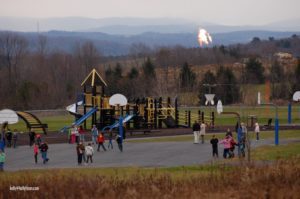
HARRISBURG, PA (November 25, 2024) – On November 21, the Pennsylvania Department of Environmental Protection (DEP) completed an initial review of a rulemaking petition submitted by Clean Air Council and Environmental Integrity Project to increase minimum no-drill zones around homes, schools, and streams. The Protective Buffers PA coalition, comprised of environmental and public health organizations, is championing the rulemaking petition. The rulemaking petition will now move to the Environmental Quality Board (EQB) for consideration.
Setbacks, also referred to as protective buffers and no-drill zones in the context of fracking, are mandatory distances that fracking wells must abide by to keep them separated from homes, schools, hospitals, drinking water wells, and surface water. Pennsylvania’s current fracking well location requirements—which include a waivable 500-foot setback from buildings and a 1,000-foot setback from water supply extraction points—are woefully insufficient to protect public health and the environment from the dangers of fracking.
The rulemaking asks the EQB to consider instituting the following research-informed setbacks:
- 3,281 feet from any building and from any drinking water well;
- 5,280 feet from any building serving vulnerable populations (e.g., schools, hospitals); and
- 750 feet from any surface water of the Commonwealth.
The EQB regulations provide that the next step in the process is that the petition will be announced at the next EQB meeting, and Clean Air Council and Environmental Integrity Project will have the chance to give a 5-minute presentation on why EQB should accept it. The DEP will make a recommendation as to whether EQB should accept it. If EQB accepts it, DEP then has 60 days to prepare a report evaluating the petition, to which the groups will be able to respond, and then DEP will make its final recommendation. If DEP recommends a regulatory change, it has 6 months to develop a proposed rulemaking for EQB consideration.
“This is an important first step in the right direction to protect the millions of Pennsylvanians who live near fracking,” said Alex Bomstein, Executive Director of Clean Air Council. “No one deserves to live with the harms and perils of fracking in their backyard.”
“Study after study shows that fracking too close to buildings and waterways has caused grave and undeniable harm to Pennsylvanians, so we’re glad our petition is moving forward.” said Lisa Hallowell, Senior Attorney with the Environmental Integrity Project. “DEP’s job is to protect people and the environment from pollution, and increasing minimum setback distances from fracking sites should be an obvious next step to protect everyone in the Commonwealth regardless of one’s politics.”
“There is no evidence that shale gas development can be done without harm to human health,” said Alison L. Steele, executive director of the Environmental Health Project. “However, greater setback distances are ultimately better for reducing health harms. The EQB’s consideration of a petition to increase setbacks can begin the critical work of correcting what was unquestionably an egregious public health error made when fracking was in its infancy. Today, we know better.”
“Those of us living on the front lines of fracking activity have known for decades that this activity is way too close to thousands of families across Pennsylvania, which was affirmed in the 43rd Grand Jury report”, said Gillian Graber Executive Director of Protect PT, a member of the coalition. “We would encourage the EQB to take swift action to support families impacted by fracking by instituting these changes,” said Graber.
“The EQB’s acceptance of this petition marks a significant step toward adopting long-overdue protections for Pennsylvania communities,” said Katie Jones, Ohio River Valley Coordinator with FracTracker Alliance. “As Attorney General, Governor Shapiro strongly advocated for commonsense measures to protect public health, including expanded no-drill zones to shield Pennsylvanians from the harmful impacts of fracking. At FracTracker, our data consistently highlights the disproportionate risks faced by frontline communities, and we urge swift action to transform this proposal into enforceable safeguards that deliver meaningful relief to those most affected.”
“Earthworks has spent the last decade proving that oil and gas operations pollute nearby homes and entire communities,” said Melissa Ostroff of Earthworks. “Requiring polluters to operate at a distance less harmful to the health of people, and especially children, is common sense and the right thing to do. We appreciate the DEP’s decision to move the petition forward, and Governor Shapiro and his administration should act quickly to set safe setback distances to protect all Pennsylvanians.”
Fracking contaminates groundwater (used for public and private drinking water supplies) and also pollutes surface water, damaging headwater streams and other ecosystems. Furthermore, spills often occur in watersheds linked to drinking water sources.
Dozens of peer-reviewed scientific studies show that a person’s proximity to fracking wells is associated with severe human health risks and a wide range of ailments, including increased cancer rates, increased hospitalization rates, and higher rates of respiratory, neurological, dermatological, and muscular symptoms. Vulnerable populations are particularly susceptible—numerous studies have shown that proximity to fracking wells harms health for infants and children. In addition to these studies, first-hand accounts of residents living near Pennsylvania fracking wells demonstrate the profound harms of living close to fracking.
HARRISBURG, PA (October 22, 2024) – Today, Clean Air Council and Environmental Integrity Project filed a rulemaking petition with the Environmental Quality Board (EQB) asking it to increase minimum setback distances from fracking wells. Setbacks, also referred to as protective buffers and no-drill zones in the context of fracking, are mandatory distances that fracking wells must abide by to keep them separated from homes, schools, hospitals, drinking water wells, and surface water. Pennsylvania’s current fracking well location requirements—which include a waivable 500-foot setback distance from buildings and a 1,000-foot setback distance from water supply extraction points—are woefully insufficient to protect public health and the environment from the numerous dangers of fracking.
Clean Air Council, Environmental Integrity Project, and a coalition of environmental and public health organizations – called Protective Buffers PA – are calling for the following research-informed setbacks:
- 3,281 feet from any building and from any drinking water well;
- 5,280 feet from any building serving vulnerable populations (e.g., schools, hospitals); and
- 750 feet from any surface water of the Commonwealth.
“The gas industry has dangerously encroached on our daily lives over the last twenty years.” said Alex Bomstein, Clean Air Council Executive Director. “Now, nearly 1.5 million Pennsylvanians live within a half mile of fracking. The harm that fracking inflicts on communities is unacceptable and no one deserves to live with fracking in their backyard.”
“The research is clear that too many Pennsylvanians have suffered a decline in their health, quality of life, and property values as a result of oil and gas companies fracking too close to buildings, wells, and waters,” said Lisa Hallowell, Senior Attorney with the Environmental Integrity Project. “Pennsylvania agencies have a constitutional duty to heed the overwhelming evidence and require minimum setbacks to protect the Commonwealth’s residents and natural resources from further peril.”
“20 years of fracking in Pennsylvania has spawned 20 years of research showing convincingly that living and working near fracking increases the risk of developing health problems,” said Ned Ketyer, MD, President of Physicians for Social Responsibility Pennsylvania. “And the closer you are to fracking the higher the risk. Increasing buffers from the present to at least 2500 feet from homes and 5000 feet from schools, hospitals, and other public buildings is a small but necessary step to protect the health of Pennsylvanians living near fracking.”
“Living a little over 500 feet from Range Resources Augustine well pad has, for the past 4 years, caused many issues for my family of five,” said Michele Stonewark, Cecil Township, PA. “We’ve suffered health issues including headaches, nausea, and bloody noses, sleepless nights due to noise and vibrations and increased stress and anxiety that compounds all of the other issues. There are days we can not go outside due to awful diesel and chemical smells and my children are forced to stay indoors. All the while, the landowners of the pad, are the furthest away from the threat we live with every day. The importance of setbacks is an issue that I will fight with all of my being, not just for my family’s health but for the health of all families in this commonwealth.”
“We have 12 well pads and one compressor station planned for our residential community and thousands of residents have already been harmed,” said Gillian Graber, impacted resident and Executive Director of Protect PT, Westmoreland County, PA. “After a decade of working to protect my community, I am tired of waiting for our government agencies, Governor Shapiro, and our legislators to act in the best interest for Pennsylvanians. That is why we need to force the issue with this rulemaking petition to protect us from a toxic industry whose sole motivation is to make money as quickly and cheaply as possible.”
When Governor Shapiro was Attorney General, the primary recommendation of the 43rd Statewide Investigating Grand Jury’s report on fracking was to enact a 2,500 foot no-drill zone between fracking and homes, as well as a 5,000 foot no-drill zone for schools and hospitals. In the fall of 2023, Governor Shapiro instructed the Pennsylvania Department of Environmental Protection (DEP) to implement some of the Grand Jury recommendations for better protecting Pennsylvania residents from oil and gas operations, but this notably did not include setbacks. Instead of asking the DEP to develop greater setbacks for the oil and gas industry, he announced a partnership with CNX – a gas company with a history of environmental violations – that included a promise to adhere to voluntary, unenforceable setbacks from homes and schools at distances well below those recommended by the Grand Jury.
Fracking contaminates groundwater (used for public and private drinking water supplies) and also pollutes surface water, impacting headwater streams and other ecosystems. Furthermore, spills often occur in watersheds linked to drinking water sources.
Dozens of peer-reviewed scientific studies show that a person’s proximity to fracking wells is associated with severe human health risks and a wide range of ailments, including increased cancer rates, increased hospitalization rates, and higher rates of respiratory, neurological, dermatological, and muscular symptoms. Vulnerable populations are particularly susceptible—numerous studies have shown that proximity to fracking wells harms health for infants and children. In addition to these studies, first-hand accounts of residents living near Pennsylvania fracking wells demonstrate the profound harms of living in close proximity to fracking.
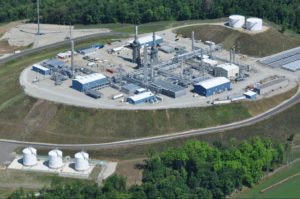
PITTSBURGH, PA (August 14, 2024) – Today, fracking company CNX released a report on the results of its efforts to monitor six air pollutants for a few months at locations near its rural fracking sites. The report, based on self-reported data, makes the sweeping conclusion that “CNX Natural Gas Development Poses No Public Health Risks.”
Of the thousands of chemicals released in fracking, CNX hand-selected six to monitor for in the air. The report did not acknowledge the significant increases in those pollutants its monitors identified downwind of its facilities. The report also did not attempt to address the science demonstrating that there is likely no safe level of cancer-causing pollutants such as benzene, which CNX’s data showed that its sites sent into the atmosphere.
CNX’s “no public health risks” conclusion is contradicted by more than 100 studies identifying the toxic air pollution from fracking and public health studies such as that done last year by the University of Pittsburgh for the Pennsylvania Department of Health, which showed strong evidence of increased illnesses in patients living near fracking wells. CNX’s report stems from a 2023 partnership with Governor Shapiro’s administration.
“CNX’s radically dishonest and irresponsible fracking report fails the fundamental tests of scientific integrity,” said Alex Bomstein, Executive Director of Clean Air Council. “The Shapiro administration should immediately disavow the report and distance itself from this propaganda.”
“There are mountains of evidence showing that from cradle to grave, fracking poses a significant risk to the public’s health,” noted David Masur, Executive Director for PennEnvironment. “Some of the glaring errors and misinformation announced today are just the tip of the toxic iceberg when it comes to harmful discharges into our air and water from fracking.”
“People in the Commonwealth are suffering and this blatant disregard for the real world hurt done for over a decade is unconscionable,” said Gillian Graber, Executive Director of Protect PT. “Governor Shapiro should know that we are not buying the snake oil, the people of Pennsylvania are too smart for that.”
“CNX has a lot of nerve to suggest that their self-collected and self-reported data can disprove a series of studies that looked at the very real, very heartbreaking impacts that children across nine counties experience living near fracking,” said Sarah Martik, Executive Director of Center for Coalfield Justice. “Governor Shapiro needs to wake up to the damage he is perpetuating by continuing in this partnership and by failing to acknowledge Pitt’s state-sponsored, peer-reviewed research.”
“CNX’s August 14th press release appears to be an attempt to dupe investors, operators, and decision makers into adopting the faulty Radical Transparency methodology across the Commonwealth in order to shape Pennsylvania’s energy policy. This is an extremely misguided idea, given ample evidence showing the health risks associated with fracking,” said Shannon Smith, Executive Director of FracTracker Alliance. “Furthermore, their data is opaque. For example, CNX does not disclose all of the chemicals used in its operations, because the disclosures contain trade secrets.”
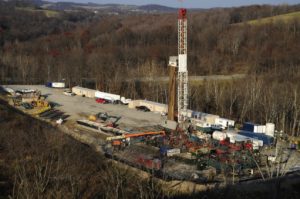
PENNSYLVANIA (June 21,2024) – The U.S. Environmental Protection Agency (EPA) and U.S. Department of Energy (DOE) announced today, June 21, the availability of $850 million in funding for projects led by agencies, tribes, states, communities, and industry that will monitor and reduce methane emissions from the oil and gas sector. Potentially-funded projects can help small operators monitor methane emissions so that leaks can be better quantified and repaired in a timely manner. The funding will also aim to create collaborative monitoring efforts between frontline communities and equipment providers, so that impacted residents will have better access to empirical data and a role to play in the air monitoring process. Overall, this funding will help states and tribes reduce methane emissions to comply with the waste emissions charge and the U.S. EPA methane rule published this past spring.
This announcement is part of EPA’s Methane Emissions Reduction Program (MERP), which was authorized under the Inflation Reduction Act of 2022. MERP provides financial and technical assistance as well as new regulations that will reduce pollution – including greenhouse gases such as methane, volatile organic compounds, and hazardous air pollutants – from the oil and gas sector. The funding made available today will build on the $350 million awarded to states last December, of which Pennsylvania received nearly $44.5 million for the plugging and monitoring low-producing conventional wells.
Matt Walker, Clean Air Council Advocacy Director issued the following statement:
“President Biden has already taken serious policy actions that will guide Pennsylvania and other states to significantly cut methane pollution from the oil and gas industry to help meet our climate goals. Today’s funding announcement builds on those solid policies with major investments for cutting edge methane-reducing technologies, and air monitoring that will provide accurate data to frontline communities. These efforts will better protect the health of Pennsylvania residents and help curb climate change.”

Philadelphia, PA (September 16, 2022) Today, the United States Court of Appeals for the Third Circuit issued a decision affirming that Pennsylvania state legislators and municipalities lacked standing to challenge the Delaware River Basin Commission’s (“DRBC”) regulation banning fracking within the Basin. Additionally, the Court rejected arguments that the trust created by Article I, Section 27 of the Pennsylvania Constitution (the “Environmental Rights Amendment” or “ERA”) was injured by the fracking ban. In rejecting this argument, the Court explicitly relied on a joint amicus brief from Clean Air Council, PennFuture, and Widener University Commonwealth Law School.
In February 2021, the DRBC banned high-volume hydraulic fracturing (commonly known as “fracking”) within the Delaware River Basin. The ban reflected the Commission’s determination that fracking “poses significant, immediate and long-term risks to the development, conservation, utilization, management, and preservation of the [Basin’s] water resources.” The Plaintiffs—two Pennsylvania state senators, the Pennsylvania Senate Republican Caucus, and several Pennsylvania municipalities—then filed a lawsuit in federal district court challenging the ban. After the District Court dismissed the suit for lack of standing, the plaintiffs appealed to the Third Circuit and raised an argument that they had standing under the ERA.
The Third Circuit, citing Clean Air Council and its partners’ amicus brief, held that the legislative plaintiffs’ ERA argument “fundamentally misunderstands the ERA and would turn it ‘upside down’ if accepted.” The Court further held that the plaintiffs’ ERA argument “ignores the explicit purpose of the ERA and mistakes the unique public trust it created for a run-of-the-mill financial trust in which the trustees have a duty to maximize profits.” The Court concluded that the fracking ban “promotes the purposes of the trust and protects its corpus by preventing Pennsylvania’s natural gas reserves, part of the Commonwealth’s ‘public natural resources,’ from being depleted.”
Joseph Otis Minott, Esq., Executive Director and Chief Counsel of Clean Air Council, issued the following statement:
“We are thrilled that the Third Circuit recognized and re-affirmed what the Pennsylvania Supreme Court has already held in no uncertain terms: The state government is constitutionally obligated to protect our public natural resources by conserving and maintaining them for present and future generations, not by extracting and ‘maximizing’ the economic value of those resources. We are hopeful that this will deter future actions by Pennsylvania state and local public officials who would seek to consume, deplete, and monetize our natural resources, rather than uphold their sworn constitutional duty to conserve and maintain them.”
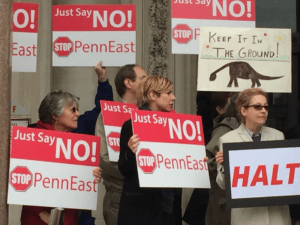
October 21, 2021 – Pennsylvania and New Jersey landowners woke up last week to news of the victory they have been working to accomplish over the last seven years: the PennEast pipeline, in a word, is dead. The company announced it would end development of its planned 118 mile, 36” diameter fracked gas pipeline from Luzerne County, PA to Mercer County, NJ.
PennEast had previously filed eminent domain proceedings against dozens of landowners in both states to build its dangerous and unneeded pipeline. For seven years, property owners in Pennsylvania and New Jersey faced lawsuits for asserting their private property rights and refusing to sell to PennEast pipeline. Hints of the pipeline’s impending demise came over the last several weeks as PennEast suddenly announced it would withdraw condemnation lawsuits against 70 property owners in Luzerne, Carbon, Monroe, Northampton and Bucks counties in Pennsylvania, and would similarly drop its plan to use eminent domain to acquire state-owned land in New Jersey.
The Council has opposed PennEast Pipeline from its inception investing time, community organizing, expertise, and legal resources into this fight. The Council:
- Called on the Delaware River Basin Commission (DRBC) and Governor Wolf to reject PennEast’s application.
- Urged the Pennsylvania Department of Environmental Protection (DEP) to hold meaningful public comment periods to assure that impacted community members would understand how the proposed pipeline would impact them.
- Participated in a scientific study by Cadmus Group to highlight the negative costs of the PennEast and Mariner East 2 pipelines on the Delaware River Basin’s ecosystems, economies, and population.
- Developed and submitted extensive technical and legal comments demonstrating to DEP the flaws in the proposed project permits.
- Sent federal agencies detailed comments explaining how the project was unneeded and harmful.
- Recruited our members to submit their own comments to state and federal agencies.
All that persistence has finally paid off.
In addition to preserving private property, residents and the Council have fought tirelessly for years to protect the 88 waterways, 44 wetlands, 30 parks, 33 conservation easements, and numerous exceptional value streams that PennEast would have crossed. The pipeline would have also plowed through some of the region’s most beloved conservation and recreation areas including Hickory Run State Park, Beltzville Lake, and Weiser State Forest.
PennEast is a private for-profit company that does not meet any public need. Its construction would have destroyed some of Pennsylvania’s most cherished natural resources and ecotourist areas, while its operation would have led to more fracking harms and climate-causing methane pollution. The end of PennEast is a huge victory for landowners, conservationists, and all those who recreate in our treasured state parks.
While the announcement is cause for celebration, lingering concerns remain as PennEast continues to make contradictory public statements about the possibility of moving ahead with a portion of the project in Pennsylvania only. This could pose a continued threat to conservation and recreation areas as well as streams, wetlands, and drinking water.
That is why Clean Air Council continues to work closely with our partners in Save Carbon County, New Jersey Conservation Foundation, Delaware Riverkeeper Network, Concerned Citizens Against the Pipeline, and Homeowners Against Land Takings (HALT) to ensure that this victory is final and permanent.
For more information contact Eve Miari, Advocacy Coordinator, emiari@cleanair.org
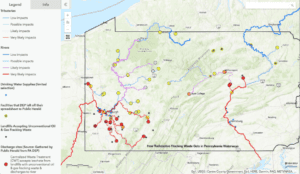
Growing up in Southwestern Pennsylvania is a beautiful experience. The region’s rivers, mountains, and picturesque small towns and beautiful cities make this an ideal place to live and grow up in. People in the area goboating, water-skiing, and swimming in the summers andhiking, snowboarding, and skiing in the winters. Fall brings beautiful,world-renowned colors, while spring is a budding new world to explore. Could you imagine a better place to live and raise a family?
However, there’s a terrible secret that the fracking industry has tried to hide from families living in the region: there is radioactive material from fracking appearing in our waterways and drinking water.
The fracking industry has taken advantage of an outdated loophole in PA law that labels fracking waste as residual waste. This is known as the radioactive fracking waste loophole. This dangerous loophole permits industry to dump radioactive fracking waste in local municipal landfills, which then turns into a watery substance called leachate. While there has been in-depth reporting on the gas industry’s radioactive secret, including from reporter Justin Nobel from the Rolling stones, many Pennsylvania residents remain unaware.
One landfill in Westmoreland County is threatening the entire Monongahela River when it knowingly accepted radioactive waste. The leachate from the fracking waste in this landfill became radioactive, and was piped directly into the Monongahela River to the Belle Vernon sewage treatment plant.
Water treatment centers in the surrounding region were confused about why all of their beneficial bacteria were dying. The chemicals released by the radioactive leachate were killing everything good and bad. Despite the public health impacts from the radioactive leachate, the Pennsylvania Department of Environmental Protection lets operations continue at the landfill company with only a small fine.
No resident should be forced to deal with radioactive material in their drinking water. Shockingly, most Pennsylvanians that live in Southwestern Pennsylvania are being exposed to radiation.
The solution is simple. We must close the fracking waste loophole by labeling fracking waste as radioactive. This would prevent the oil and gas industry from being able to dump radioactive fracking waste in municipal landfills.
Clean Air Council is supporting legislation in the Pennsylvania House and Senate introduced by House Representative Sara Inamoratoe and Senator Katie Muth that would repeal the language under Title 58 that exempts the oil and gas industry from complying with the provisions of the Solid Waste Management Act and classify drilling waste as “hazardous waste” under the Solid Waste Management Act.
The Council is dedicated to ending this radioactive fracking waste loophole and protecting drinking water for the millions of people who depend on it in Southwestern Pennsylvania .
For more information about this issue, please contact Lois Bower-Bjornson, Outreach Coordinator, lbb@cleanair.org
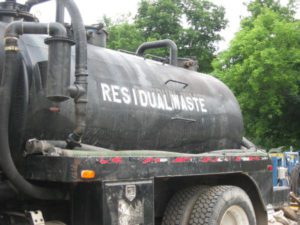
Photo: Iris Marie Bloom
Clean Air Council and its allies achieved a major victory in March in their efforts to ensure that the voices of Pennsylvanians are heard when it comes to fracking and the toxic waste it produces!
While many people know that the fracking industry pollutes the air and water, a lesser-known aspect of the process is how the industry handles and recirculates the toxic liquids fracking generates. When drilling a gas well, several different types of waste liquids need to be disposed of. First, there is “produced water,” which refers to a type of brine that comes up and out of the gas well from underground. Although it is naturally occurring, it is noxious and harmful if mixed with surface or groundwater. Next is “flowback,” which is the liquid that comes back up after being injected into the fracked well. This includes a chemical cocktail of fracking fluids and whatever happens to be picked up deep underground. Drilling fluid waste and other oil and gas liquids wastes also need to be dealt with.
The Pennsylvania Department of Environmental Protection allows gas companies to collect this waste in tanks and pits and then process and reuse it. Though DEP calls this “beneficial use,” the liquid wastes are used to frack more wells — and there is nothing beneficial about that. These dirty operations often spill their toxic waste and rack up violations.
DEP first created a general permitting process for these waste facilities a decade ago. Each permit issued then lasted ten years. As these permits were ready to expire at the close of 2020, the Department revised the general permit. Under the revised plan, the public would have notice of any proposals for waste facilities to be covered under the new permits and an opportunity to provide comments and feedback on those proposals.
However, once DEP finalized the general permit, it went right ahead and issued the approvals for almost all of the fracking waste facilities in Pennsylvania without giving the public a heads-up or opportunity to comment. All of a sudden, 49 facilities had the go-ahead to continue or expand their operations without neighbors or the broader public even having had a chance to review their plans to see if they are flawed or risky.
The environmental community in Pennsylvania came together and demanded that DEP reverse course and allow the public to weigh in on these plans for fracking waste facilities. Following up on that request, the Pittsburgh Post-Gazette on February 10 came out with an editorial calling on DEP to revoke the permits. Although DEP had not opened a comment period, groups still had the opportunity to appeal the permits within 30 days — which was coming up soon. Acting quickly, Clean Air Council joined with its allies to prepare to appeal as many permits as was necessary to ensure that flawed plans for fracking waste facilities would not go forward without scrutiny. The environmental groups and DEP put their heads together for negotiations and, on the eve of the permit appeal deadline, came to an agreement: DEP would provide the public with notice of all 49 permit applications and open up a comment period on all of them. And flaws the public brought to DEP’s attention would be corrected in modifications to the permits. Because the appeal period was closing, the environmental groups could continue ahead with appeals of six of the sites.
This great victory provides the public with the chance to weigh in which had previously been denied. The most recent edition of the Pennsylvania Bulletin announces the 60-day comment period for the waste sites and gives the public instruction on how to submit comments. You can click here and scroll down to “General Permit Coverage for Residual Waste General Permits” to submit your comments today!
Fracking waste storage sites are some of the dirtiest operations around. We’re proud to have been a key part of the effort to ensure that the gas industry didn’t get a pass due to DEP’s mistake. And we’re not done yet: we appealed those six permits, so there’s more fight to come!
For more information, contact Alex Bomstein, Senior Litigation Attorney, at abomstein@cleanair.org

